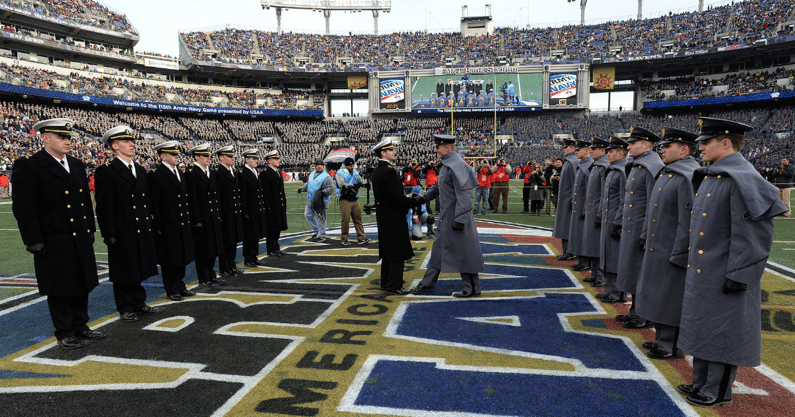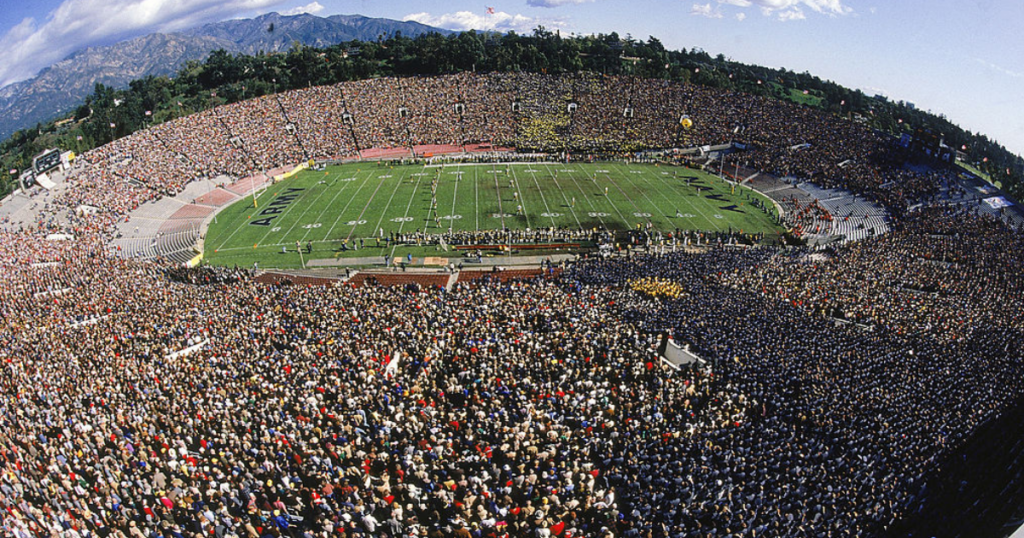There’s ‘a strong appetite’ to take Army-Navy, ‘America’s Game,’ on the road

Participating in a Ground Zero remembrance, an evening gala on Ellis Island and a rivalry game just across the Hudson River at MetLife Stadium are just some of the ways Army and Navy this weekend will recognize the 20th anniversary of the attacks of September 11, 2001. Only one location was suited to host the 122nd meeting between the academies.
Saturday’s game at MetLife will mark the eighth time since 2000 that the annual matchup is played somewhere other than Philadelphia. But the game has not been played outside the Northeast since the two institutions made a memorable appearance at the Rose Bowl stadium in 1983, the only time the matchup has happened west of the Mississippi River.
Should an annual game this special, this unique — one that has the national stage all to itself in mid-December — be moved around and spotlighted in various cities nationwide? After the game returns to Philadelphia’s Lincoln Financial Field next year, opportunities abound: Eight cities have filed a letter of intent to bid on Army-Navy games between 2023 and 2027, Navy deputy athletic director Eric Ruden told On3, including some outside the Northeast.
When asked to characterize how strong the appetite is to stage this event at least occasionally outside the Northeast, Army athletic director Mike Buddie told On3: “It is a strong appetite.”
Officials at both academies declined to disclose which cities are expressing interest in submitting a bid early next year for the game. And when asked directly about Los Angeles’ sparkling new SoFi Stadium — which will host the Super Bowl this season, the College Football Playoff National Championship in 2023 and the Summer Olympics in 2028 — Buddie only said, “No doubt a beautiful stadium.”
The calculus of how Army and Navy assess bids is multifaceted. There’s a financial component. Revenue garnered from a winning bid is split evenly between institutions. And Buddie noted that both academies lean heavily on that revenue to help support other sports. But this game is unique in that the entire student bodies of both institutions—some 8,000 cadets and midshipmen in total — attend the matchup.
“Think about that,” Ruden said. “You won’t find that at a bowl game, you won’t find that at a national championship game or a Final Four.”
This weekend, the majority of those cadets and midshipmen will board several dozen buses to transport them into the area from West Point and Annapolis. If this game is to be played outside the Northeast, the onus would be on the host city to provide air transportation for nearly 10,000 students.

In 1983, Rolfe Arnhym, then-president of the Pasadena Chamber of Commerce and the executive vice president of the Army-Navy 1983 Foundation, which staged the game, told the New York Times that the price tag to transport the students was $3.5 million. Nearly 35 chartered commercial planes flew the corps of cadets and brigade of midshipmen to Los Angeles. Once there, about 1,500 stayed in hotels while 7,500 were housed with 3,800 families in the Pasadena area.
“It is still a hot conversation amongst the West Pointers in the student body at the time,” Buddie said. “Some of them had phenomenal experiences in a good way. Some of them had phenomenal experiences in a memorable way. And some of them had phenomenal experiences in a bad way.”
Asked to elaborate, Buddie said, “When you’re staying with a host family, you never know what you’re going to get. Some of them were 10-bedroom mansions with a swimming pool, and some were less luxurious accommodations.”
Housing aside, Buddie acknowledged several reasons why a strong desire exists to occasionally play the game outside the Northeast. First, both academies recruit nationally. There also are military stations and bases throughout the country. And this is, after all, billed as “America’s Game.”
“This game belongs to the United States,” Buddie said. “It just doesn’t belong in the Northeast. Anytime there is an opportunity to broaden where we take this game, we take it very seriously and hope that it makes sense.”
For an Army-Navy matchup outside the Northeast, Buddie conceded that to make the finances work there “needs to be patriotic-minded people who are probably willing to break even or even lose a few dollars on the game. … We can’t do it for cheap just to spread it to different parts of the country, but if we can find a way for finances to make sense and kill two birds with one stone by going outside the normal footprint, that’s a win-win.”
Top 10
- 1
SEC victory lap
Super Bowl billboards a bold touch
- 2New
Greg Sankey
Calls for CFP change
- 3
Ryan Day picks OC
Brian Hartline promoted at Ohio State
- 4Hot
Brian Kelly responds
Greg Brooks Jr. allegation amid lawsuit
- 5
Jalen Milroe
'You don't ask a zebra to be a dog'
Get the On3 Top 10 to your inbox every morning
By clicking "Subscribe to Newsletter", I agree to On3's Privacy Notice, Terms, and use of my personal information described therein.
The decision-makers include Buddie and his counterpart at Navy, athletic director Chet Gladchuk, along with three staff members from each academy. Questions and recommendations are funneled through a third-party law office that they enlist. No TV partners are involved in the decision-making process for site selection.
In addition to financial considerations, special anniversaries also fare actors. For instance, 2026 will mark the 100-year anniversary of the only Army-Navy game played at Chicago’s Soldier Field.
Historically, the host site, Army and Navy each receive about one-third of available tickets to sell. The academies satisfy sponsorships out of their allotments, then sell the rest of the tickets. When Buddie first got to West Point in 2019, he circled the game this year as a potential challenge because it’s one of the biggest venues (80,000-plus seats) Army has ever played in and there always is a bevy of alternate entertainment options in New York City. Yankee Stadium also was under consideration to host this year’s game, Ruden said, but the MetLife Stadium bid won in 2016. And school officials now are delighted because the game is sold out.
The case for continuing to hold the event nearly annually at Philadelphia’s Lincoln Financial Field also is a strong one. As Buddie noted, considering the scale of this “monster” event, it’s the devil that you know versus the devil that you don’t know. Fans know the hotels they like, the restaurants they like. And it’s roughly halfway between the campuses.
Ruden said a familiarity exists with the city of Philadelphia, the stadium and the Eagles — who assist in running the event — “so when you’ve got that experience, it certainly is something that gives you a bit of security knowing they’ve done it before.”
When Buddie first arrived at West Point, Gladchuk told him that they were the stewards of the best, most important rivalry in the nation, and that always needs to come first. All stakeholders certainly will be mindful of that when they assess bids from cities in the coming months.
A request for proposal has been made to cities that have declared an interest. Representatives from several of those cities will be hosted at Saturday’s game to evaluate the scope of the event’s operations.
For an American staple whose home has exclusively been in the Northeast the past few decades, the matchup in Pasadena nearly 40 years ago remains distinguished. The memories for many still resonate. And as Buddie said, the appetite for game locales outside the Northeast is strong.
“It should be a national game,” Buddie said. “But, again, there are a lot of factors that go into the decision-making.”